Bitcoin as an Antidote to Despair: A Psychological Formulation
| If you find WORDS helpful, Bitcoin donations are unnecessary but appreciated. Our goal is to spread and preserve Bitcoin writings for future generations. Read more. | Make a Donation |
Bitcoin as an Antidote to Despair: A Psychological Formulation
By Aaron Clendenin
POsted October 21, 2020
One of my favorite axioms in the practice of psychotherapy is that, “All behavior is multi-determined,” meaning there are multiple forces or inputs exerting pressure or influence into the ultimate expression of any given behavior. As far as we can tell there are very few, if any, behaviors that occur from a singular cause. One might argue that an involuntary motor reflex could be the exception to this general rule but the conditions would still be a factor and environmental determinants are typically considered as part of individual behavioral analyses or empirical tests of behavioral models. If a pharmacological agent was given to deaden the nerve or nervous system, then you would get a blunted or absent response. What is happening biochemically and electrically in the body from that agent is an environmental determinant with regard to the reflexive behavior.
Another quick but powerful example is the subjective experience of hunger and the desire to eat food (target behavior). Obviously, consuming some form of nutrition to sustain life is a foundational biological drive for survival but, even still, hunger and the subsequent food-seeking behavior can be controlled within certain limits. We don’t have to eat as soon as we feel hunger. Just saying, it seems like a lot of people don’t know this and need to hear it. Or maybe they do know and are just unfortunate slaves to their impulses, lacking a well-developed prefrontal cortex of executive functions (analyzing, planning, predicting, initiating, self-monitoring, organizing, and inhibiting) that regulate personal behavior. I digress you might say, but perhaps not. We’ll come back to that later.
The experience of hunger and the subsequent behavior of eating is not a pure stimulus-response function (strict behaviorism) It is a stimulus-organism-response chain (cognitive-behavioral orientation) through which we have the ability to affect the present experience and the likely outcomes in some way. When conceptualizing complex human behavior in an attempt to define relationships and identify relevant and proximate causes, one can quickly begin to move into the realm of reductio ad infinitum. So if you accept my general premise that human behavior is very complex and has multiple determinants, then we can move forward.
Here is a table on Levels of Explanation with a partial list of factors that makes the same point…
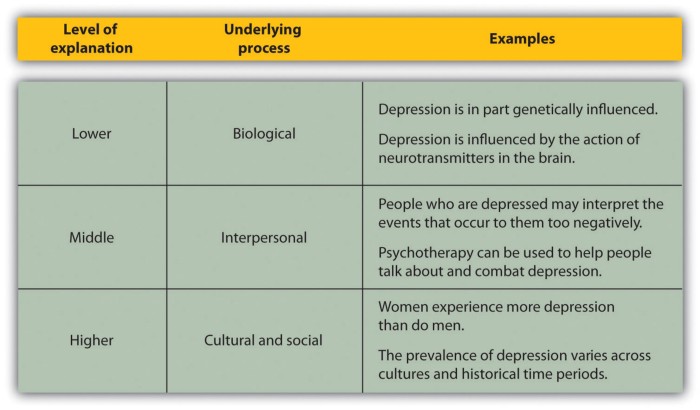
…multiple determining factors related to the construct we call depression that manifests as a syndrome (cluster of pathological symptoms).
One final point of housekeeping, if we were observing someone who is depressed, we might say, “How are they behaving?” (in total) and we would go on to describe what we see that are typical patterns of behavior found in people who are depressed. These patterns can also be broken down further into individual or distinctly identifiable behaviors. All of this is “behavior” so it is necessary to jump up and down the levels sometimes for the sake of simplicity, as you can see by my long introduction to get us here. This piece is a conceptual article grounded in well-established psychological principles and findings, my own career practicing as a therapist in addictions and mental health, and my personal experience with Bitcoin. It is an attempt to bring together ideas that have been bouncing around my head since going down the Bitcoin rabbit hole over the last year. Please take it is as such.
Back to psychotherapy and behavior change…very often through the course of therapy, positive gains are achieved simply from helping clients enlarge their perspective on their own motivations and helping them view or reevaluate their own behavior through various lenses or possible interpretations. This phenomenon is called insight and, I would argue, it was the founding principle on which the field of psychotherapy began, at least the modalities of psychotherapy that facilitate the client’s participation in the process of self-healing. Other therapies have been developed that do not need to invoke client awareness but those are usually for more specialized purposes. I am more focused here on the individual as an intentional participant as such in the healing process.
One of the foundational researchers in our current understanding of depression is Martin Seligman from the University of Pennsylvania. He first posited the theory of learned helplessness as an explanatory model of depression. His pivotal research program for developing this theory is noteworthy to briefly review: Dogs were placed in an electrified box. They were given a mild electrical shock but could escape to the other side which they did. Then a barrier was put up so they could not escape to the other side when shocked. After enough trials (experiences), they stopped trying to escape when shocked even after the barrier was removed. Essentially, they had learned that their efforts were futile and gave up on finding a solution. The more scientific and behaviorally technical way to articulate this model is stated: Repeated exposure to uncontrollable and aversive environmental stimuli leads gradually to the belief that the aversive situation is inescapable and a sense of helplessness ensues regarding the situation.
So it is with many people who find themselves in a state of despair. Merriam-Webster defines despair as “loss of hope,” “utter loss of hope,” or “hopelessness.” Despair and clinical depression are not equivalent concepts but they are intertwined in the cognitive and emotional realms. In fact, when assessing someone for suicide risk, asking them about hope is a key part of the formulation. What positive things do they have to live for, like family relations or a significant event coming up? Do they have other positive plans for the future? How could they imagine things getting better? Tellingly, the diagnosis of Major Depressive Disorder has as its first criteria in the DSM-5: “Depressed mood most of the day…by subjective report (e.g feels sad, empty, hopeless).”
I have worked with many depressed clients over the years and I have been depressed myself at one point in life. It is not hyperbole to say the phenomenology (personal subjective experience) of hopelessness is all-consuming. It is insidious and pervasive. It cuts right down to the soul of the individual and affects their perceptions, memory recall, worldview and future outlook, and much of their ability to think rationally or self-regulate in almost all domains of life. I think, in a very real sense, when one loses hope they lose “everything.” In that hopeless state of despair, they have lost their potentiality, not in an absolute sense maybe but at least in the belief of any possibility of positive likely outcomes for future improvements to their situation. Therefore, they have lost their future, at least phenomenologically, in the present moment. You could call it the spiritual death of the self…unless hope is restored.

Learned helplessness was a major contribution to our understanding of depression but all scientific theories and findings have limitations and needs for elaboration, refinement, and/or disconfirmation. Building off learned helplessness theory, Abramson and colleagues developed the hopelessness theory of depression. In short, learned helplessness failed to explain why some people got depressed and some didn’t. Hopelessness theory added an attributional component. The contention in hopelessness theory is that the attribution (explanation) of the stimuli and circumstances makes a difference in the experience. A related concept to these two theories is the difference between external versus internal locus of control. Am I mostly a victim of my circumstances or can I effect significant change in my life despite whatever circumstances happen to be?
In reviewing other cognitive and interpersonal models of depression going back to the origin of modern psychology, the common thread seems to be some cognitive component of attribution/interpretation. Freud viewed clinical despair/depression as emanating from a deep anxiety, a distressed reaction of the psyche to a mismatch between desires and attainments. In fact the DSM-I had as the diagnostic nomenclature “Depressive Reaction” referring to this type of etiology, depression acting as a defense mechanism for the underlying anxiety triggered by challenging life circumstances. Jung similarly viewed it as a spiritual crisis, broadly speaking. Dr. Viktor Frankl who suffered through the Nazi concentration camps and later developed Logotherapy, based on finding meaning in one’s life and through one’s suffering, developed the simple equation of D=S-M. Despair equals Suffering minus (without) Meaning. Our contemporary cognitive-behavioral terminology also speaks of cognitive dissonance which is the mismatch between one’s desires and/or values and their actual behavior which then causes distress in the person.
Unfortunately in many of the therapeutic disciplines, we have moved further away from the interpretation of lived experience and the functions of our reactions into a symptom identification model as we have been forced to “economize” and use “brief, solution-focused” treatments based on dwindling resources and fiat money standards of care, much of it driven by insurance companies and HMOs as many have written about elsewhere. Nevertheless, what has not changed is that how we interpret and explain things to ourselves and the actions we take with the knowledge or insights that we have determine, to a very large extent, our likely outcomes. Personal responsibility and self-agency are inescapable and fundamental in the behavior change and healing process if we are to obtain any approximation of the life we desire.

Another instrumental theory in psychology has been social learning theory developed by Albert Bandura. Social learning theory built off the previous behaviorism of classical and operant conditioning but added that 1) mediating processes occur between stimulus and response and 2) behavior is learned from the environment through observation. Two key concepts in social learning theory are self-efficacy and expectancies. Self-efficacy, according to Bandura, is “how well one can execute courses of action required to deal with prospective situations.” I would elaborate on this for the reader and say that self-efficacy has both cognitive and emotional elements incorporated into it. It is a self-appraisal about an ability in a given area and a general feeling that corresponds to that ability-based appraisal. Expectancy is simply this: I engage in a specific behavior and I expect a likely outcome or a probabilistic range of outcomes. So, expectancies and self-efficacy inform and interact with each other. Self-efficacy is more categorical whereas expectancies are specific to discrete behaviors.
In substance use research, it has been discovered that children as young as three and four years old have expectancies about alcohol consumption. Preschoolers can’t read or write sufficiently so a fill-in-the-blank interview format is used. An example item would be, “When mommy drinks wine she (acts)… silly, giggles a lot, falls down, gets sad, dances around, cries sometimes, forgets to brush my teeth, and similar items that reflect the behavioral chain of likely possibilities. This was an important discovery because it showed that we begin to develop expectancies very early in life for a range of human behaviors that we are not directly engaging in ourselves while we still have very limited understanding of the world around us. Those expectancies also later shape our decision-making about engaging in those behaviors and even the interpretation of experiences if we happen to engage in those specific behaviors. What’s more, the actual biological and social effects of alcohol consumption and surrounding events then shape our ongoing expectancies and, very often, change the expectancies that we developed much earlier in life, by either overturning them or amplifying them, depending on the experience and our interpretations. Like I said, “simple” human behavior is very complex.
The astute reader will be able to generalize the likelihood that this phenomenon is also present from a very young age in how we relate to money and the financial conditions of our immediate environment and the world at large. I have very little knowledge about computer science but I think it is fair to say that expectancies are part of the informational code in our human operating system. They are always there below the user interface keeping the system running but also vulnerable to bugs and glitches and hacks which can disrupt the functioning, slow the system down, or cause it to crash if not maintained properly.
Why this is relevant to despair and hopefulness is that most of our positive emotion is experienced in pursuit of meaningful goals. Self-efficacy to effect change in a specific domain of life is the lynchpin on which much of our motivational capacity depends if one is to continue to strive for better days and persist in the face of adversity. If I extrapolate my own experience, I would say that the specific behavior of buying Bitcoin has the potential to change our expectancies about future likely outcomes, within certain parameters if conditions continue to be met, as is always true when we interact with a dynamic, ever-changing environment. The main condition over the medium- and long-terms would have to be that Number (continue to) Go Up, though I think there are many other potential benefits in the future that fall into the category of unknown unknowns. I agree with others in this space that Bitcoin has the power to act as a larger healing force on our world for a variety of reasons and one pathway of that change is through the psychological effects it has on individuals. When we see these same effects in the course of practice, they are typically described as “therapeutic” because they are moving the individual from a relatively undesirable state toward something more functional that predicts improved chances of success and better long-term outcomes.
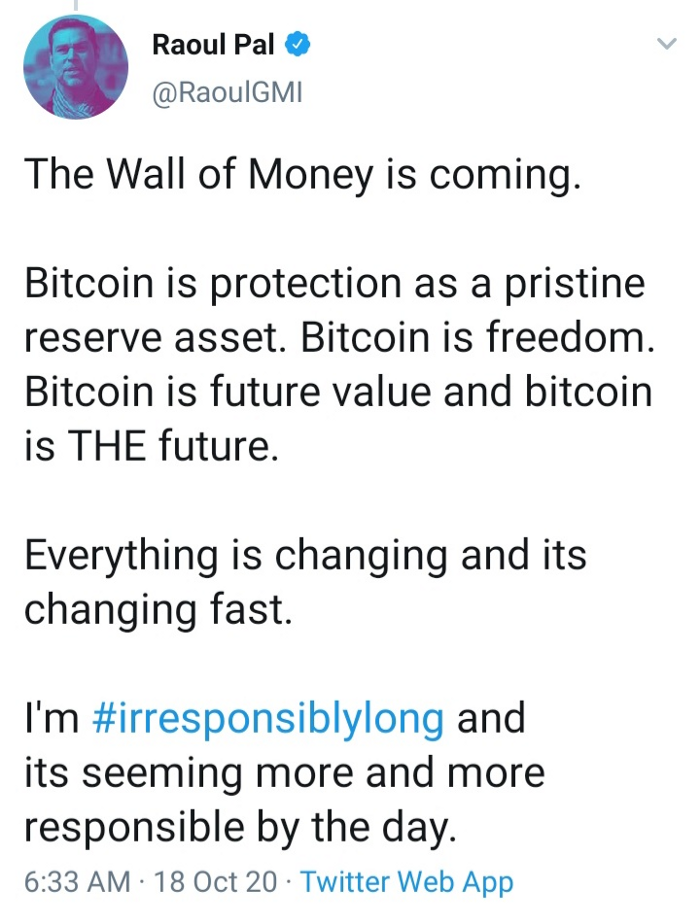
As disturbing as the dog-zapper studies from the 60’s and 70’s might be to our modern sensibilities, Dr. Seligman went in a new direction later in his career and began to study what makes people excel. What helps people thrive? How do you Live Your Best Life as the saying goes? Instead of focusing on problems and just coping with life, how do we transcend not just our typical deficits and problems, but consequentially our preoccupation with deficits and problems — our unhealthy, heightened vigilance to threats and pain as conceptualized in evolutionary psychology. Simple but long overdue, this shift led to a focus on strengths and virtues instead of problems and weaknesses. Thus, the sub-discipline of Positive Psychology was born and has been contributing to the scientific literature and improvement of many lives for the past two decades. You can get a fuller review of the history and research findings at positivepsychology.com but the essential elements to answer the big questions posed above are: 1) Positive emotions, 2) Engagement, 3) Relationships, 4) Meaning, and 5) Accomplishments (PERMA). To me, this kind of thinking seems to naturally align with Jeff Booth’s work in outlining a future of deflationary abundance. We need a new cultural mindset to adequately interface with a new monetary paradigm and, like so many other forces that seem to be converging, this is yet another piece of the puzzle that has emerged at a serendipitous time in space.
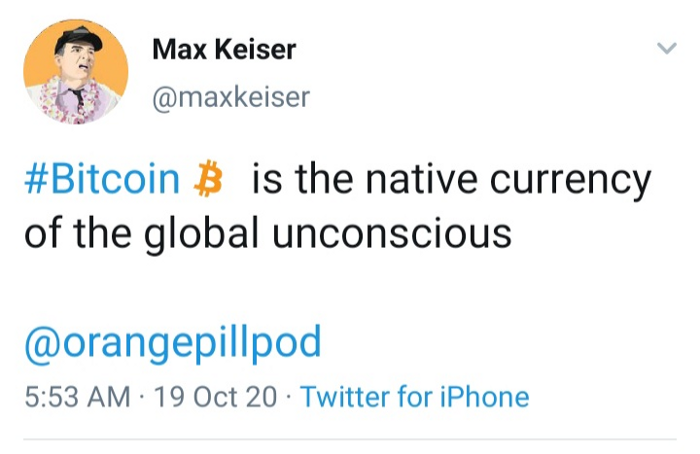
In developing his model of relapse prevention, Marlatt emphasized that a significant factor in recovering from chemical addictions was to develop healthier “positive addictions” as a replacement, activities such as exercise, healthy eating, meditation, recreation, or new hobbies. This might seem like common sense to many of us but the importance is not readily apparent at the outset to many in recovery. Those individuals who struggle to find and cultivate these replacements have a much tougher go, on average. Yes, it is good to subtract negative things from our lives but then a void exists. It must be filled with something functional, positively reinforcing, and self-sustaining if we are to be successful over the long term.
Below, I share a conceptual model with known and accepted psychological concepts and systemic effects describing my experience and what I observe in others with their experience of Bitcoin, along with some additional hypothesized variables that could be gleaned from the clinical research literature. Admittedly, it is an incomplete representation but it is my first attempt at a psychological formulation of how Bitcoin might be an antidote to financial despair. I’m not trying to launch a research program though others might find that worthwhile. Yet, I believe the overall concept is sound. Additionally, it would not be surprising to see positive effects in one or more of these variables facilitate positive spill-over effects into others (health, relationships, community, etc.), which happens quite frequently in practice with the generalization of therapeutic effects.
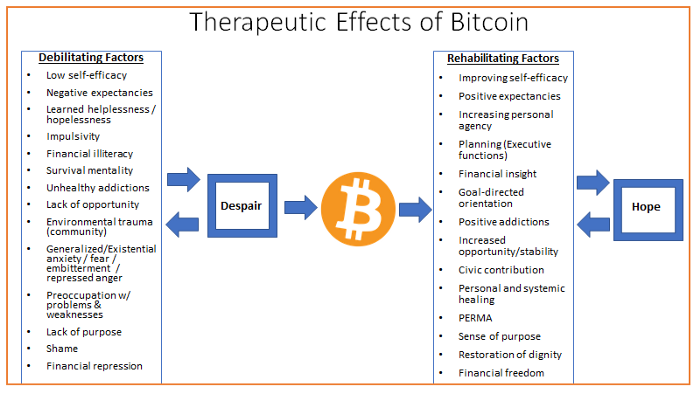
I read somewhere that culture is the personality of a nation. Like many of you, I feel like our cultural personality is decompensating, which is an old psychiatric term used to describe an acute breakdown in effective psychological functioning. However, if people see that our broken monetary system can be fixed or, at least, that they can have an effective solution to somehow “opt out” or improve their long-term financial situation regardless of government corruption and manipulations, then they might have hope. Ultimately, hope acts as a force multiplier. What financial value can be generated by a country or a world full of hope?! On some level, hope is what keeps civilization moving forward. When you have hope, you have everything because it contains all future potential. What is the stock-to-flow ratio of hope?! I say hope must continue its steady climb upward just like bitcoin, regardless of circumstances.

Saving in Bitcoin gives an individual hope about their personal financial situation and about the potential collective improvement of the world in which they live. It has the ability to change expectancies about likely outcomes, on balance, from negative to positive. It can improve self-efficacy for successfully navigating a complex world full of pits and vipers. It can invoke a person to plan for the future as they increase financial insight and find meaningful engagement in a local or virtual community. Finding some form of long-delayed success can alleviate shame for many and ameliorate feelings of anxiety and anger as they find dignity restored. These benefits also allow a greater sense of personal agency over the direction of one’s life and can ripple out into greater civic contribution if one is so inclined.
I don’t think it solves all problems but it does have the possibility to address many of our current temporal concerns. As I’ve read articles and interacted on FinTwit in the Bitcoin community, what has struck me the most was how much hope seems to be generated by this technology and this community toward finding solutions and improving the lives of so many people. I have experienced that hope myself for my own financial future and the future of my children. So, I felt like this was important and I might have something to contribute. This thing that we are experiencing together and hoping for is definitely worth fighting for.
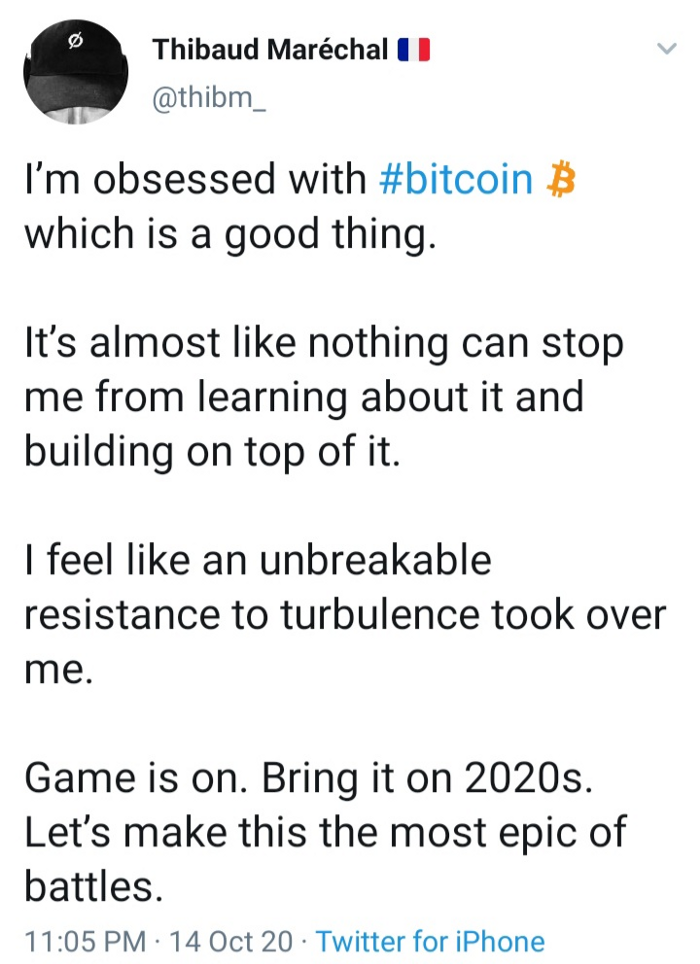
Carl Rogers described an integrated person as “unified within him/herself at all levels and with low discrepancy between the present self and the desired self. The optimal functioning of a person occurs when the various aspects of a person are integrated into a relatively harmonious organization.” Rogers is also noteworthy for developing client-centered therapy which is, above all else, tasked with treating every person with “unconditional positive regard.” This tenet of Rogers’ therapeutic positioning is now accepted as standard best practice in all psychological therapies and forms the basis of the recently codified trauma-informed approaches. It is the ultimate respect for the dignity and sovereignty of every individual.
Why is this same standard of dignity and sovereignty not granted to us in the management of our personal lives in the financial sphere? Unless we address this deficit in our cultural personality, we will continue to persist in a state of dis-ease and dis-integration. I think there is much to be gained as we advance by buttressing the philosophy and economics of Bitcoin with established psychological principles, research findings, and ethics. Hopefully I have demonstrated, at least in part, that if we were to take the best aspects of traditional psychotherapy and modern psychological science to design a money that is compassionate, healing, and equitable, which promotes the best opportunity for human well-being and optimal psychological functioning, then Bitcoin is that money. We may even wonder if this technology is one of the keys to true social justice that so many are looking for but continue to misdiagnose because the core issues are masked below the symptoms?
References
Bandura, A. (1977). Social learning theory. Englewood Cliffs, NJ: Prentice Hall.
American Psychiatric Association. (2013). Diagnostic and statistical manual of mental disorders (5th ed.).
Marlatt G.A. & Gordon J.R., editors. (1985) Relapse Prevention: Maintenance Strategies in the Treatment of Addictive Behaviors. New York: Guilford Press.
https://www.thenewatlantis.com/publications/the-neuroscience-of-despair
https://www.merriam-webster.com/dictionary/despair
https://www.ncbi.nlm.nih.gov/pmc/articles/PMC5299163/
https://www.ncbi.nlm.nih.gov/pmc/articles/PMC4594954/
https://www.ncbi.nlm.nih.gov/pmc/articles/PMC4689589/
https://www.researchgate.net/publication/285420438_The_psychologically_integrated_person_and_the_parameters_of_optimal_functioning
https://positivepsychology.com
